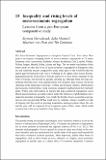Inequality and rising levels of socio-economic segregation : lessons from a pan-European comparative study
Abstract
The Socio-Economic Segregation in European Capital Cities: East Meets West project investigates changing levels of socio-economic segregation in 13 major European cities: Amsterdam, Budapest, Vienna, Stockholm, Oslo, London, Vilnius, Tallinn, Prague, Madrid, Milan, Athens and Riga. The two main conclusions of this major study are that the levels of socio-economic segregation in European cities are still relatively modest compared to some other parts of the world but that the spatial gap between poor and rich is widening in all capital cities across Europe. Segregation levels in the East of Europe started at a lower level compared to the West of Europe, but the East is quickly catching up, although there are large differences between cities. Four central factors were found to play a major role in the changing urban landscape in Europe: welfare and housing regimes, globalisation and economic restructuring, rising economic inequality and historical development paths. Where state intervention in Europe has long countered segregation, (neo) liberal transformations in welfare states, under the influence of globalisation, have caused an increase in inequality. As a result, the levels of socio-economic segregation are moving upwards. If this trend were to continue, Europe would be at risk of slipping into the epoch of growing inequalities and segregation where the rich and the poor will live separate lives in separate parts of their cities, which could seriously harm the social stability of our future cities.
Citation
Marcińczak , S , Musterd , S , van Ham , M & Tammaru , T 2015 , Inequality and rising levels of socio-economic segregation : lessons from a pan-European comparative study . in T Tammaru , S Marcińczak , M van Ham & S Musterd (eds) , Socio-economic segregation in European capital cities : East meets West . Regions and cities , vol. 89 , Routledge Taylor & Francis Group , pp. 358-382 .
Publication
Socio-economic segregation in European capital cities
Type
Book item
Description
The research leading to these results has received funding from the Estonian Research Council (Institutional Research Grant IUT no. 2–17 on Spatial Population Mobility and Geographical Changes in Urban Regions); the European Research Council under the European Union’s Seventh Framework Programme (FP/2007-2013) / ERC Grant Agreement no. 615159 (ERC Consolidator Grant DEPRIVEDHOODS, Socio-spatial Inequality, Deprived Neighbourhoods, and Neighbourhood Effects); and from the Marie Curie programme under the European Union’s Seventh Framework Programme (FP/2007–2013) / Career Integration Grant no. PCIG10-GA-2011-303728 (CIG Grant NBHCHOICE, Neighbourhood Choice, Neighbourhood Sorting, and Neighbourhood Effects).Collections
Items in the St Andrews Research Repository are protected by copyright, with all rights reserved, unless otherwise indicated.

